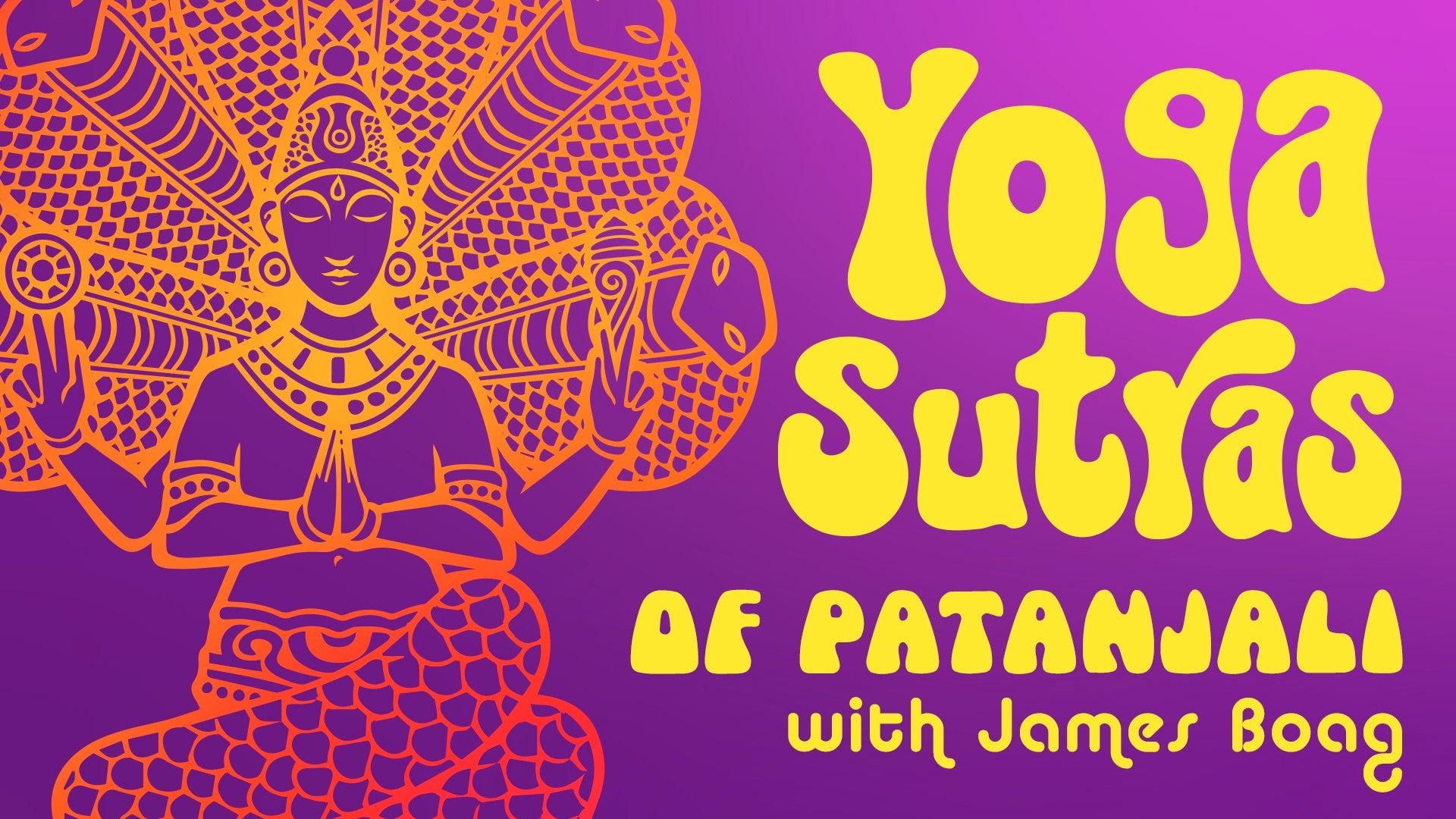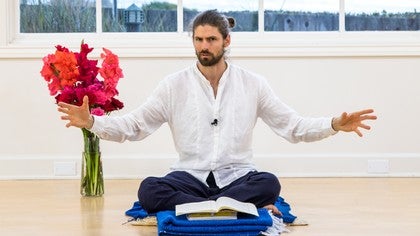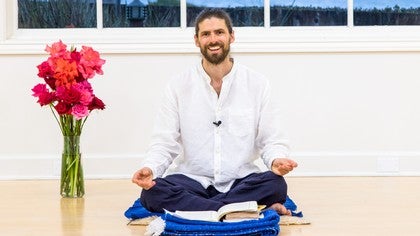Description
About This Video
Transcript
Read Full Transcript
So all the while, during this first chapter, Patani has been developing the theme, we might say, of yoga as steadiness and clarity. So he said right at the beginning, it's altogether natural and normal, that because the lenses and powers of our awareness are made of the changing stuff of nature, and because they allow us to experience change, we can readily get identified with change, and we can accrue conditionings that habituate ourselves to partiality, to only partial experience rather than whole integrated experience. In the 33rd to the 39th sutra, Patani has given us a very broad and inclusive map, if you like, or guidebook to supports for practice. Here in the 40th sutra, Patani talks about the effect of that, so if you do bring about through these techniques, through these attitudes, through that steadfast, steady effort to cultivate that awareness of the essence, then what will happen? And he says in the 40th sutra, paramanu, paramamahatvantosya vashi kara ha. Now this word, vashi kara ha, is not the first time that we're encountering it in this first chapter, it also appears earlier on when Patani begins to define vairagya in the 15th sutra.
And he said there, vrishtanu shravikayevitrishnasya vashi kara sangea vairagyaam. So vairagya was that state in which we're no longer thirsting after things we've previously already experienced, or things we've only just heard about, because we are conscious of the, let's say, greater richness, the superiority of that which we can relish when we just channel the forces of our awareness. So here this word comes up again, vashi kara ha. So it basically means to be under your conscious mastery, you might say. So what is under your conscious control? Paramanu, paramamahatvantosya vashi kara ha. So paramahanu, basically means, anu is an atom, it's the Sanskrit word for atom. So paramahanu means the smallest of the smallest, minutest of the atoms, the subatomic, if you like.
Paramamahatva means the greatest of the greatest. So from the smallest of the smallest to the greatest of the greatest comes within the ambit of that yogin's conscious mastery. What a statement. So what does this mean? So at the ultimate level, what it means, and this is not my personal experience, but this is just what I'm understanding from my study of the text now, is that ultimately the established yogin, their awareness becomes so steadily, deeply established and so subtly refined that they are able to perceive anything within the totality from the smallest of the smallest to the greatest to the greatest and be steady in that perception.
But what does this mean at a more immediate level? The idea is through practice, from the smallest of the smallest to the greatest to the greatest, you become steadier. So whether we have to do something which demands very subtle acute presence, whether we have to do something that demands that all our forces are in active operation, we can still be steady. So whether we are called upon to be very, very subtle, very, very, let's say, contained, or whether we are called upon to be more expansive, in any point on that spectrum of our activity, we can still be clear and steady. So the idea is as we practice, that steadiness starts to be felt, relished, known and experienced from the smallest to the smallest to the greatest to the greatest, in other words, through the whole spectrum of our experience.
Similarly, as we start to clarify our awareness, we start to clean the smallest to the smallest and the greatest to the greatest. So we mentioned earlier this idea that the awareness is sometimes equated to a lake. And as the awareness gets concentrated, it's like the surface of the lake stills and it allows us to see deeper inside it. But we might not perhaps see all the way to the bottom of the lake because there is accumulated detritus there. There is some junk down there.
And some of the junk is very subtle. And some is so big, it was like the elephant in the room that we couldn't see because we'd chosen not to. And so the idea is as we keep practicing subtle things that we have not seen before and gross things that have been kind of evident but we have been in a pattern that has perpetuated a certain blindness to it, they will get cleansed, they will get dissolved. And as that happens, those blocks within our awareness, they get cleansed, they get cleared. And so in all the compartments of our being, they start to get opened up and integrated into one clear field and we start to know more of our self, more of the whole range or spectrum of who we are.
So a more immediate practical level, this is one of the, let's say, more immediately down to earth applications of this teaching, is that the more we practice, the more we start to understand the whole of our self, including those parts that previously have been, for whatever reason, off our radar. So when we see sutras like this, and there will be more of them as the sutras continue, and we will get into some of these sutras in the final section of this chapter, they start talking about these really kind of, let's say rather grandiose ideas or ideas which may be beyond what we have experienced. They talk about our awareness being at this very, let's say, rarefied level, this very established unified state. Now if we have not necessarily experienced that, it can seem a bit like, wow. But if we think about this at an immediate practical level, it potentially says here, the effect of clarifying the awareness with all these practices and these attitudes that he's mentioned, is that that yogi's awareness starts to become really established.
It's like they've got mastery over the deployment of the awareness at every level, from the smallest to the smallest, the most subtle, to the greatest to the greatest, to the most manifest. And so the way that I think we can kind of construe this for ourselves, wherever we are in our own practice, is that we can start to notice, and this is very noticeable with continued practice, is that when we practice being alert and paying attention, we start to notice our own patterns a little bit more quickly than we might have done before. We start to notice where we are not actually making a choice, but are acting out of our habituated conditioned patterns a little bit more quickly than before. And so the steady practice, it can bring into the lens of our awareness things that are clouding our chitta, things that are perpetuating blockages in our capacity to be steady and easy with what is. And so the steadiness of the practice encourages these things to be brought to the surface, brought into awareness, where we can then do something about it.
And so this is the beautiful thing with yoga. Let's say we do notice that we have a pattern, we have a habit that is not serving us, when we notice something like that, we might notice that, oh, I have this self-loathing, and we might noticing it might feel like we loathe ourselves even more because we have it, or we notice, oh, I have this anger, and we might get angry with ourselves for being angry. We can get the idea. But in noticing, let's say in yoga, well, this is a cause for celebration because once you're aware of it, this is the huge first step. If you're not aware of the problem, hard to do anything about it, but once you're aware of it, you're already empowered.
As soon as you've noticed, you are able now to respond in ways that you weren't able to before. So when it wasn't on the radar, not much we can do. Once we've noticed, then it becomes something that is in play. We can work with it. We can explore it.
We can use it positively, constructively, to find out more about our real resources and to deepen our capacity for real harmonization in the grounded reality of our life and our psyche. All of that really means in practice.
Yoga Sutras of Patanjali: Now That We Are Clear
Comments

You need to be a subscriber to post a comment.
Please Log In or Create an Account to start your free trial.







